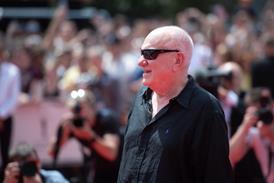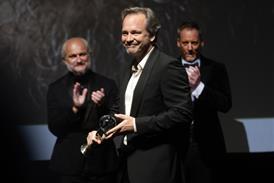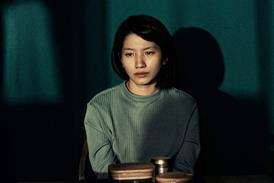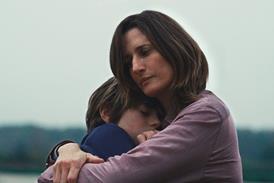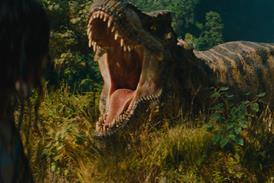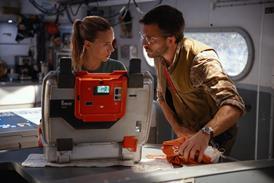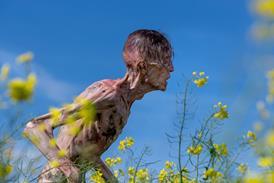Dir/scr: Woody Allen. US. 2014. 97mins
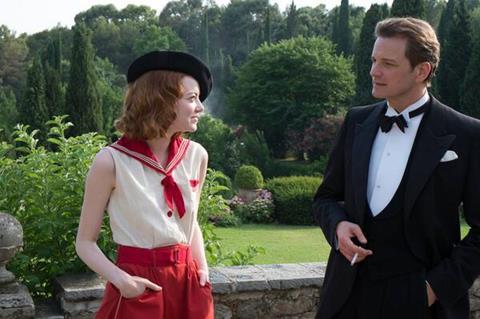
The rational and the inexplicable duke it out in Allen’s latest rom-com. In the prolific director’s film sphere, whether it is located on Manhattan’s Upper West Side or in a Europe like the one here on a strangely spotless Cote d’Azur, that translates into a sustained battle between head and heart. His track record, the genre, even the title itself leave little doubt that, no matter how much logic impedes its irrational pull, like a deus ex machine the power of love ultimately wins the bout.
Not unusual in an Allen film, the acting is perhaps the strongest suit in the entire enterprise.
Good box-office is not one of the director’s strong suits—Blue Jasmine with nearly $96 million worldwide was an exception - and this minor addition to his output does not seem likely to alter the pattern, except possibly in some strongly Woodyphilic territories like France and Italy. If it can be deemed one actor’s film, it is Firth’s, not Stone’s, so it will not get an audience that might flock to a feature that foregrounds her more prominently.
Except for sometimes gratuitously nasty put-downs, better suited for the out-of-date senior gay generation in British TV’s current Vicious, nothing edgy that might lure more than hardcore Allen fans pops outs in this milieu of mostly wealthy Americans and cultured Brits in this rendition of a not-so-roaring twenties. A wafer-thin script will not nourish much commercial life.
Firth shines as Stanley Crawford, egocentric, articulate, and highly educated if severely lacking in curiosity, a middle-aged resident of London’s posh Belgravia who tours unrecognised as the famed “Chinese” magician Wei Ling Soo. Supremely confident, a master conjuror in complete control of both his popular repertoire and a mindset that makes Descartes’s seem a chaotic mass in comparison, he is requested by Howard Burkan (a fine McBurney), an old school chum and fellow, if less accomplished, prestidigitator, to visit under the assumed name of Stanley Taplinger the magnificent southern French villa of the loaded American widow Grace Catledge (Weaver), a sweet, gullible old woman so desperate to contact her late husband that she has fallen into the clutches of an attractive, self-proclaimed spiritual medium, Sophie Baker (Stone).
The purpose of Stanley’s stay is to seek out Sophie’s Achilles heel and expose her, a task which he relishes. It’s not only a chance for him to take down a notch an uppity practitioner of one of the otherworldly practices like holding séances so much in vogue at the time, but, as it turns out, an outlet for this arrogant, exceedingly condescending man to aim sarcastic if darkly amusing barbs at what appears to be an easy target: a much younger American female from the working class with little formal education.
Meanwhile, Sophie’s shyster stage mother (Harden) shamelessly squeezes the vulnerable matriarch for money to start a “foundation” for occult studies; and Brice (Linklater), the graceless scion of the Catledge clan, has fallen for Sophie and woos her shamelessly with promises of material comfort if she will marry him—an offer which the gal from the wrong side of the tracks is tempted to accept. (For the most part, Allen appears contemptuous of his American characters, but fawning over the Brits.)
The journey affords Stanley the chance to spend time with his beloved Aunt Vanessa (Atkins), a well-to-do spinster with a mysterious romantic past who had played a major role in his upbringing, and who lives alone in a large house not far from the Catledge estate. Vanessa is the only person who can reach the stubborn man. Maybe it requires it takes a professional of Atkins’s calibre to slyly slip the subtle nuances that convince him that he has reached significant conclusions all by himself. Vanessa the catalyst for a memorable scene, one bravely tackling the concept of the religious leap of faith, in which Stanley makes a sudden about-face in his struggle against the onslaught of forces beyond his comprehension.
Not unusual in an Allen film, the acting is perhaps the strongest suit in the entire enterprise. At first Stone does not seem up to the task of going up against Firth, either as an actor or character. As the plot, such as it is, thickens, she becomes surer of herself and begins to deflect his verbal spittle and exhibit her own subdued strengths; her resilient power kicks in. It’s not just because Stanley is beginning to question his worldview: Her Sophie exhibits a toughness beyond her years, without any butch or bitchy posing.
On the technical side, the film is polished, but too much so. Cinematographer Khondji says he used old Cinemascope lenses from the ‘70s and shot on film, and then used special processes to get the “autochrome” look of colour from the beginning of the 20th century. Yet no matter how you slice it, the movie comes across as a tourist brochure, a collection of beautiful, inert postcards: shots of the Mediterranean, the French gardens, the grand homes, the staid ball. The vintage cars gleam, as if they have just been washed and shined; the perfect period costumes seem just too freshly pressed.
These choices just may be conscious mannerisms; it’s difficult to know. The film contains several performances, from Wei Ling Loo’s magic show to Brice’s serenading Sophie with a tellingly small ukulele to dance scenes in a cabaret to the séances themselves, and a case might be made that all the gloss is consistent with the artifice inherent in those particular “show” sequences; the film is itself one extended performance. (The fine old music, however, classics such as It All Depends on You and You Do Something to Me, is not much more than simple backup for the storyline. Incidentally, the film is unrelated to the Spinners’ 1982 funk/soul hit of the same name, the lyrics of which are totally downbeat: “When the magic in the moonlight dies/Get ready for the hurt inside.”)
What cannot be questioned is the aching beauty of the most pointed, and poignant, scene of all: Sophie and Stanley retreat from a rainstorm into an empty old observatory and open the dome to a night sky with a crescent moon. Pure magic.
Production companies: Gravier Productions, Inc., A Dippermouth Production, Perdido Productions, Ske-Dat-De-Dat Productions
International sales: FilmNation Entertainment, www.filmnation.com
Producers: Letty Aronson, Stephen Tenenbaum, Edward Walson
Co-producers: Helen Robin, Raphael Benoliel
Executive producer: Ronald L. Chez
Co-executive producer: Jack Rollins
Cinematography: Darius Khondji
Editor: Alisa Lepselter
Production designer: Anne Seibel
Main cast: Eileen Atkins, Colin Firth, Marcia Gay Harden, Hamish Linklater, Simon McBurney, Emma Stone, Jacki Weaver, Erica Leerhsen, Catherine McCormick, Jeremy Shamos




